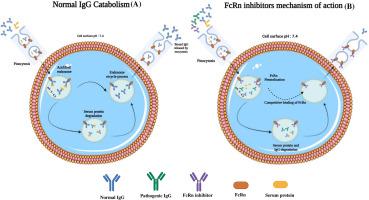FcRn inhibitors in immune thrombocytopenia: A comprehensive review of therapeutic advances and clinical outcomes
IF 3.7
3区 医学
Q2 BIOCHEMISTRY & MOLECULAR BIOLOGY
引用次数: 0
Abstract
Immune thrombocytopenia (ITP) is an autoimmune disorder characterized by low platelet counts, leading to bleeding risks. Despite existing treatments, many patients with chronic or refractory ITP remain inadequately managed. Fc-receptors, including neonatal Fc receptor (FcRn), play a crucial role in the ITP pathogenesis by activating antibody-dependent cell-mediated cytotoxicity and antibody-dependent cell-mediated phagocytosis, leading to platelet destruction. In addition, recent insights highlight cytokine dysregulation, particularly involving interleukin (IL)-17, IL-6, and Interferon-gamma (IFN-γ), as contributing to disease persistence and immune dysfunction. We sought to evaluate the efficacy and safety of FcRn inhibitors for chronic or persistent ITP treatment. PubMed/Medline, Scopus, and Web of Science databases were systematically searched until January 16th, 2025. Preclinical and clinical studies with available full-text in English were included. Efgartigimod significantly improved platelet counts and reduced Immunoglobulin G (IgG) levels in refractory as well as chronic patients with minimal adverse effects. Rozanolixizumab also showed favorable outcomes in terms of platelet count elevation and IgG reduction in Phase 2 and Phase 3 clinical trials in cases who were unresponsive to ≥2 standard-of-care ITP treatments. These immunotherapeutic agents can effectively increase platelet counts and reduce IgG serum levels, addressing a critical need in patients who do not respond to corticosteroids, thrombopoietin receptor agonists (TPO-RAs), and rituximab. Further long-term studies are warranted to confirm these findings and explore their broader clinical implications.

FcRn抑制剂治疗免疫性血小板减少症:治疗进展和临床结果的综合综述
免疫性血小板减少症(ITP)是一种自身免疫性疾病,其特征是血小板计数低,导致出血风险。尽管有现有的治疗方法,许多慢性或难治性ITP患者仍然没有得到充分的治疗。Fc受体,包括新生儿Fc受体(FcRn),通过激活抗体依赖性细胞介导的细胞毒性和抗体依赖性细胞介导的吞噬作用,导致血小板破坏,在ITP发病机制中起着至关重要的作用。此外,最近的见解强调细胞因子失调,特别是涉及白细胞介素(IL)-17, IL-6和干扰素-γ (IFN-γ),有助于疾病持续和免疫功能障碍。我们试图评估FcRn抑制剂治疗慢性或持续性ITP的有效性和安全性。PubMed/Medline, Scopus和Web of Science数据库被系统地检索到2025年1月16日。包括临床前和临床研究,并提供英文全文。埃夫加替莫显著改善难治性和慢性患者的血小板计数和降低免疫球蛋白G (IgG)水平,不良反应最小。在2期和3期临床试验中,在对≥2种标准治疗ITP治疗无反应的患者中,Rozanolixizumab在血小板计数升高和IgG降低方面也显示出有利的结果。这些免疫治疗药物可以有效地增加血小板计数和降低血清IgG水平,解决了对皮质类固醇、血小板生成素受体激动剂(tppo - ras)和利妥昔单抗无反应的患者的关键需求。需要进一步的长期研究来证实这些发现并探索其更广泛的临床意义。
本文章由计算机程序翻译,如有差异,请以英文原文为准。
求助全文
约1分钟内获得全文
求助全文
来源期刊

Cytokine
医学-免疫学
CiteScore
7.60
自引率
2.60%
发文量
262
审稿时长
48 days
期刊介绍:
The journal Cytokine has an open access mirror journal Cytokine: X, sharing the same aims and scope, editorial team, submission system and rigorous peer review.
* Devoted exclusively to the study of the molecular biology, genetics, biochemistry, immunology, genome-wide association studies, pathobiology, diagnostic and clinical applications of all known interleukins, hematopoietic factors, growth factors, cytotoxins, interferons, new cytokines, and chemokines, Cytokine provides comprehensive coverage of cytokines and their mechanisms of actions, 12 times a year by publishing original high quality refereed scientific papers from prominent investigators in both the academic and industrial sectors.
We will publish 3 major types of manuscripts:
1) Original manuscripts describing research results.
2) Basic and clinical reviews describing cytokine actions and regulation.
3) Short commentaries/perspectives on recently published aspects of cytokines, pathogenesis and clinical results.
 求助内容:
求助内容: 应助结果提醒方式:
应助结果提醒方式:


